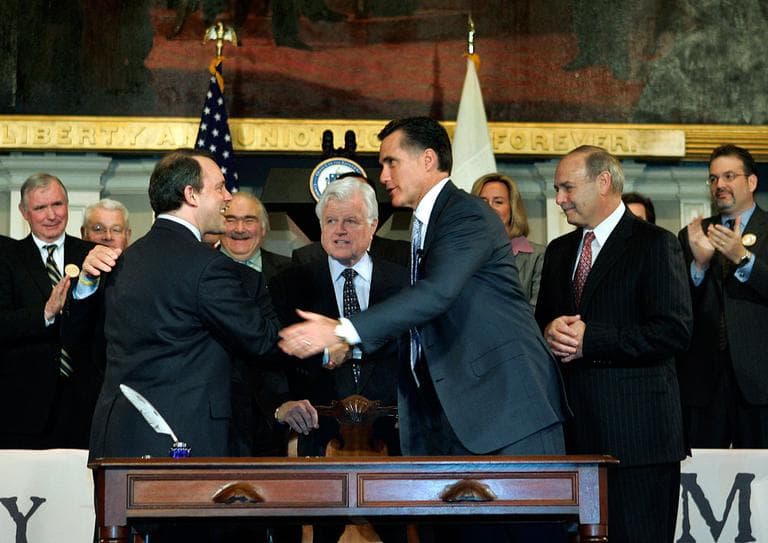Advertisement
Mass. Marks 5 Years Of Health Care Reform
Resume
Five years ago Tuesday, with sunshine blazing through the windows of a packed Faneuil Hall, then-Gov. Mitt Romney signed what he called a bold health care reform law.
Romney, a Republican, teamed up with Democratic House and Senate leaders to avoid losing hundreds of millions of federal health care dollars. Romney thanked the business, health care and consumer group leaders who supported the law.
"Massachusetts once again is taking a giant leap forward and it’s our faith in you that gives us the confidence to do just that," he said.
The leap to near-universal coverage had a rough landing at first. More residents than expected signed on to free or subsidized coverage. Had the state underestimated the number of uninsured residents? Would the cost of catching up on years of unmet health needs overwhelm the system?
Three years into the law, a report (PDF) from the Massachusetts Taxpayers Foundation concluded that it was coming in under budget.
"We had enrolled people more quickly than we'd expected," said Taxpayers Foundation President Michael Widmer. "The sharp increase in spending leveled off. So on balance this has been a very good deal for taxpayers and has not broken the budget, despite some popular misunderstanding."
There is little solid research that shows residents are healthier or are living longer as a result of the law, but there are lots of individual tributes.
Dennis Foley was 59 when he walked into an emergency room two years ago with a life-threatening foot infection. While treating that infection, doctors diagnosed diabetes, high blood pressure and a heart problem — and signed him on to the state’s health insurance plan. This was his first visit to a doctor in 30 years.
"I ended up with a severe foot infection, went to Good Samaritan Hospital in Brockton," Foley said. "It was an 18-day stay. They enrolled me in MassHealth and [I'm] doing good."
Foley is among the 98 percent of the state's residents who now have health insurance. Five years after enacting reform, Massachusetts has the lowest uninsured rate in the country.
That is the main accomplishment of the law, according to Harvard School of Public Health Associate Dean Nancy Turnbull. But does it mean residents are healthier now?
"Well we know that not having health insurance is bad for your health," Turnbull said. "On the other hand, though, we know that access to care, which health insurance enables, is only one part — and actually quite a small part — of what makes people healthier. We know that poverty and lack of education, lack of housing and many behaviors — smoking and other things — are actually much more contributors to ill health. So while expanding health insurance is a good thing, it's not sufficient."
Echoing Widmer, Turnbull said the reform's expansion of coverage has been consistent with budgetary projections and she said that a lot of the short-term cost pressure is coming from increased Medicaid rolls in the recession.
But, she added, "it's very clear that without controlling health care costs, the law is not financially sustainable. And unless we find durable ways to control costs, we won't be able to sustain the coverage extension. Whether there's the commitment to do that remains to be seen." She then cited Gov. Deval Patrick and Senate President Therese Murray, who have both indicated that health care cost containment is a priority.
"But this has, forever it seems, really been the third rail of health care politics here and in the country as a whole, so I think the jury's still very much out on what will be done."
This program aired on April 12, 2011.